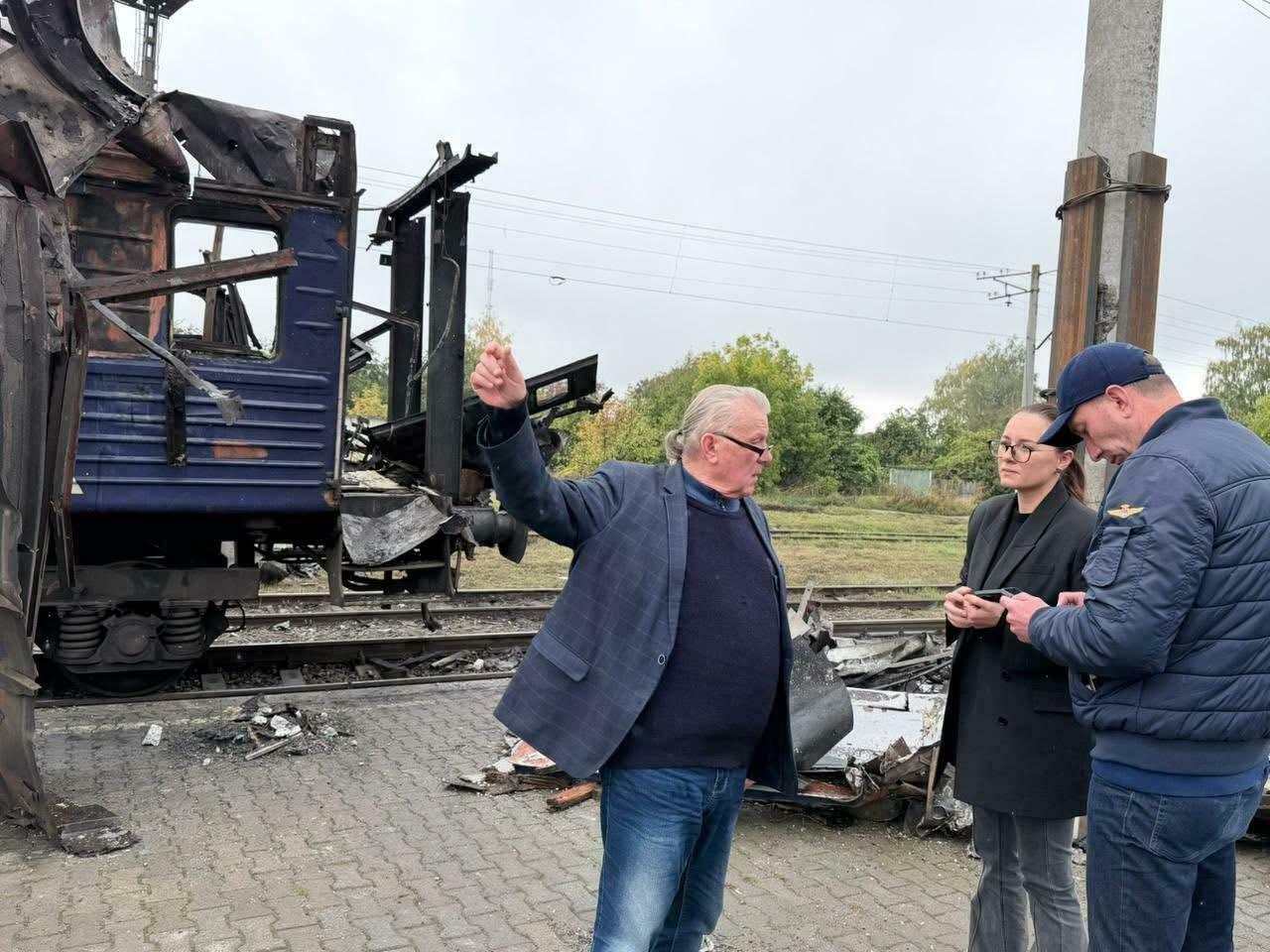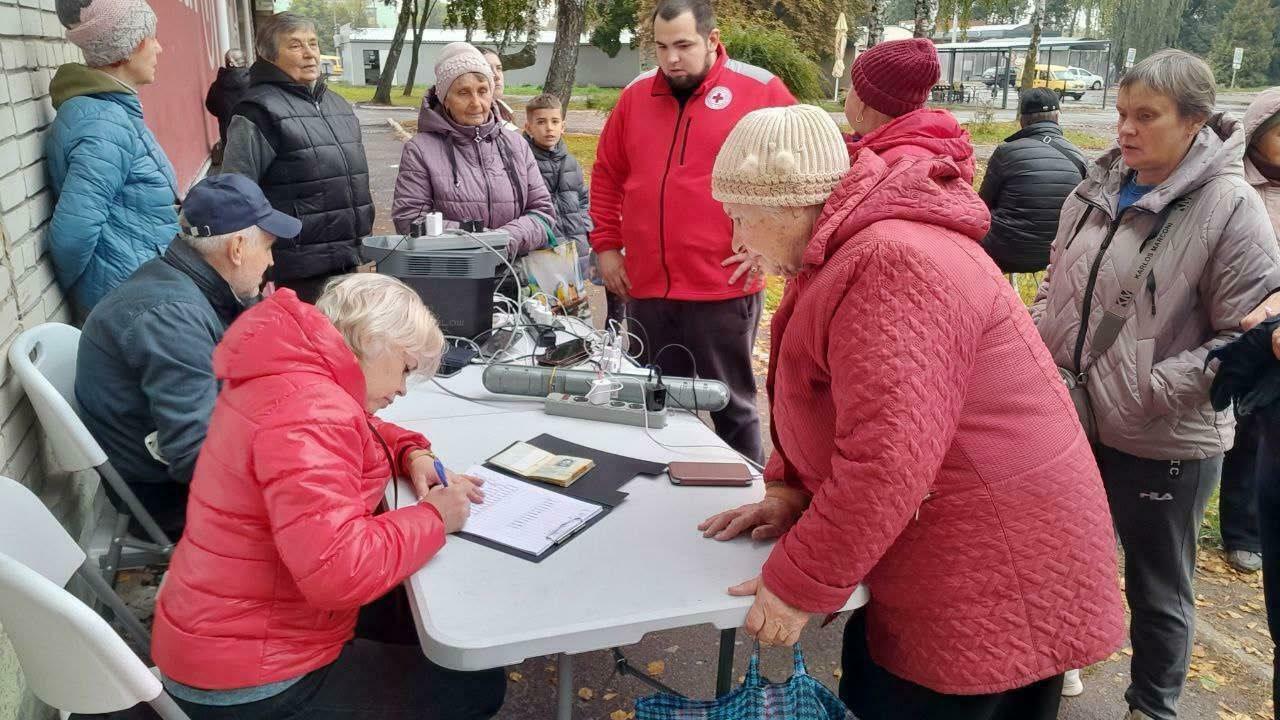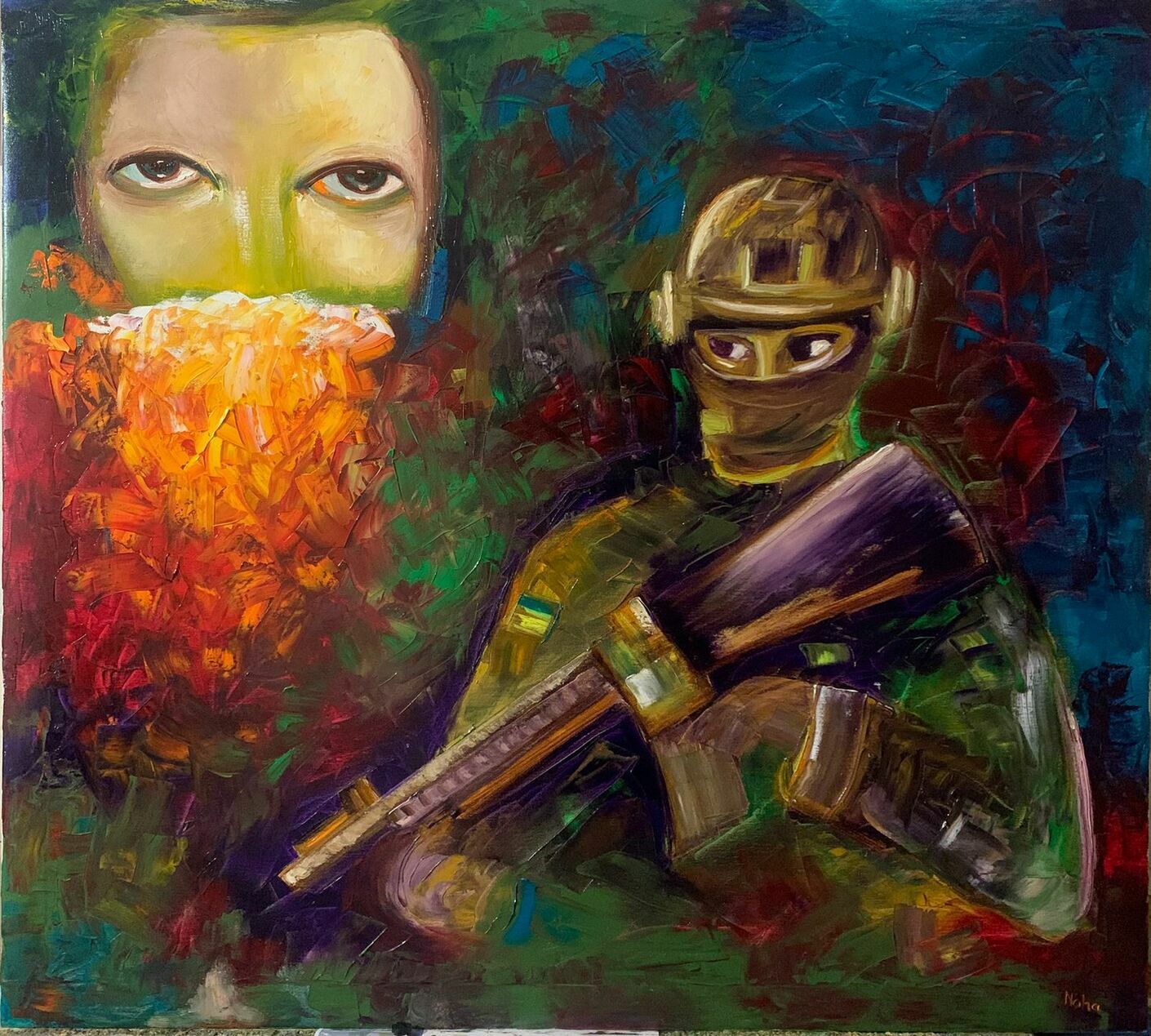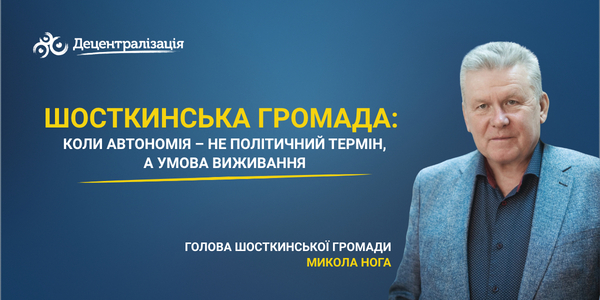Shostka community: When autonomy is not just a political term, but a condition for survival. Interview with the community leader
Mykola Noha, Head of the Shostka community, on the aftermath of Russian shelling, underground schools and hospitals, and how Ukraine is uniting all of Europe
By Dmytro Syniak
The invaders are increasingly targeting small, regional energy facilities in Ukraine that are unlikely to be protected by Patriot air defence systems. Recently, photos of residents of Shostka forced to cook food on bonfires after Russian attacks on such facilities went viral around the world. Russia is also targeting transport infrastructure in the border region. On 4 October, for example, it attacked the railway station in Shostka twice. The first strike hit the locomotive of the Tereshchynska–Novhorod-Siverskyi short-distance train. During the subsequent evacuation, a second strike hit the electric locomotive of the Kyiv–Shostka train. As a result, around 30 people were injured and one person was killed. The attack also damaged the city’s power, water, and gas supply systems. We wanted to talk to Mykola Noha, the head of the Shostka community since 2001, in detail about how the community is heroically resisting the Russian invaders. However, he immediately warned us that he would not be able to give a long interview. ‘You want me to talk to you for half an hour?’ he exclaimed. ‘But my staff meeting lasts a maximum of 20 minutes! My principle is to do everything quickly. So please hurry up and ask your questions.’
 Mykola Noha, Mayor of Shostka since 2001
Mykola Noha, Mayor of Shostka since 2001
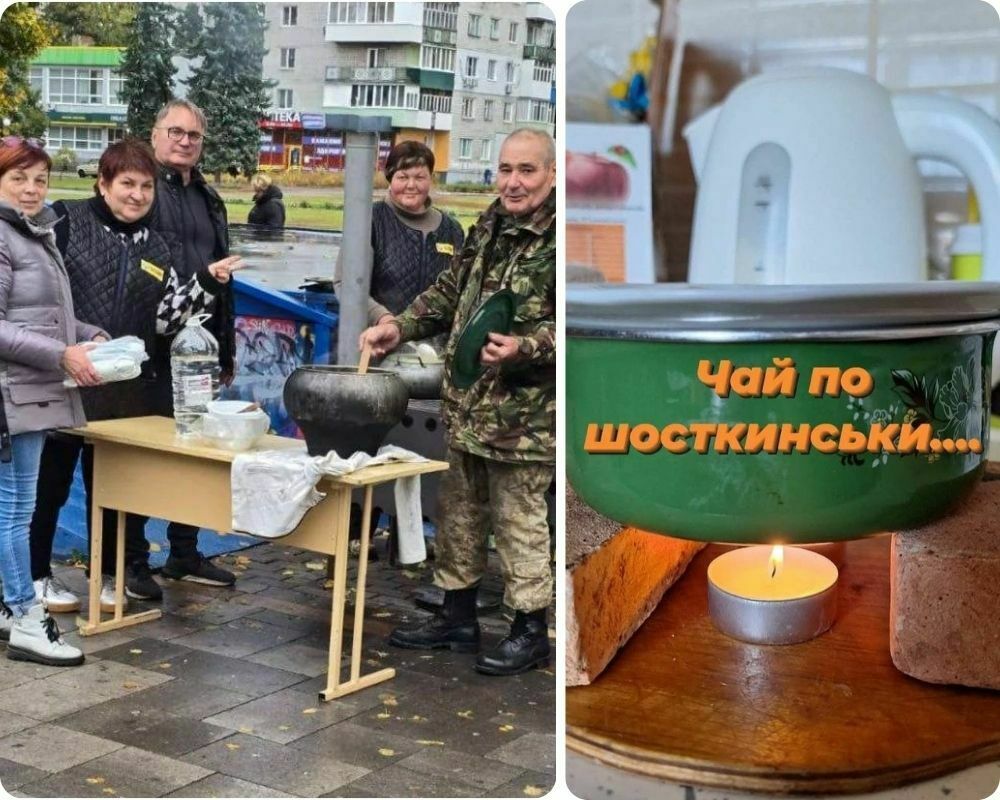

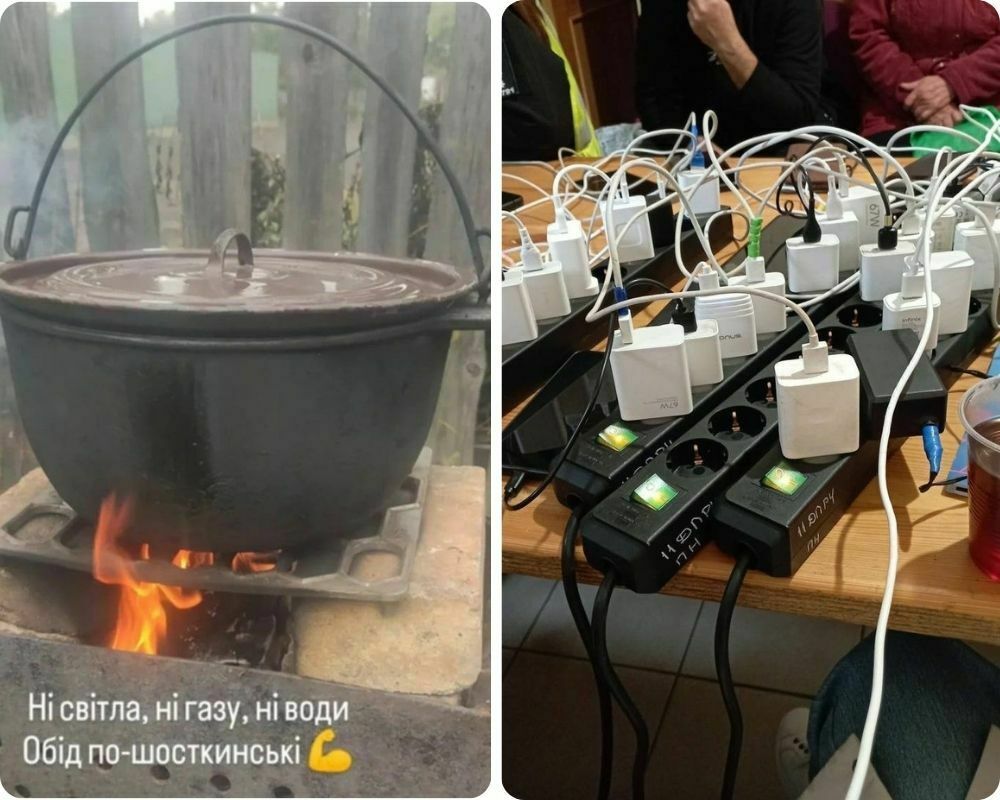
Life in Shostka today
The autonomous community
In early October, all of Ukraine’s attention was focused on Shostka, which had been badly hit by the Russian army. What is the situation in the city now?
Indeed, on 3–4 October, the Russian aggressor launched a massive bombardment of the Shostka community. As a result, many energy facilities were destroyed, including those responsible for generating electricity and supplying water and gas to the population. We immediately began eliminating the consequences of these terrible attacks, supplying water using alternative energy sources. Water is now supplied at times agreed with residents: in the morning, at lunchtime, and in the evening. The longest period is in the evening, from 5 p.m. to 9 p.m., which is not enough, of course, but allows us to carry out all the necessary work.
How long did it take for the water and gas to be restored after the Russian strikes?
A few hours. We started the restoration work very quickly. Of course, this does not mean that all 100 per cent of the residents in the community have water yet, because the water supply system has three levels: first, second, and third. This means that the lower floors of apartment buildings have water more often than the upper floors. This is inconvenient and unfortunate, but I believe it is a perfectly adequate temporary solution in these conditions. The power supply system is extremely complex and was severely damaged by the Russians, so restoration is ongoing. It will take time to fully restore it. However, the gas supply has been restored to most buildings, although some flats and private houses still do not have this service. But we are working on it.
Does your community have access to enough alternative energy sources?
Currently, we are supplied with electricity by various generators that have been sent to us from all over Ukraine. Some operate using appropriate switches, but they all need breaks in their operation one way or another. Therefore, we have to organise their work so that the electricity supply coincides with the water supply schedule, since electricity is primarily needed to operate water pumps. Of course, there is not enough electricity, which means that people are sometimes forced to live in truly miserable conditions.
It seems that the Shostka community only has one option: to be as autonomous as possible. Correct?
Yes. If you want to live on the border, it is now quite obvious that you must have an autonomous power and water supply system, as well as an autonomous heating and life-saving system. By the latter, I mean a bomb shelter or a basement. In fact, to promote these safety systems, our city council has introduced a number of special programmes since the full-scale invasion began. For instance, we already reimburse people for part of the cost of buying generators. I cannot specify an exact amount because generators vary greatly in terms of both type and price. They are also selling very quickly: 80 units have been purchased in the last few days alone. So, it is very difficult to calculate. However, yes, we do reimburse part of the cost. Thanks to this, we already have more than 600 generators of various types and sizes in operation. The same applies to our residents purchasing solar panels. We have also recently started reimbursing people for part of the cost of purchasing potbelly stoves, to ensure that nobody freezes in winter even if there is no central heating.
Is having more than 600 generators a lot or a little?
In total, our community currently has a population of around 90,000, with 74,000 of those living in the city of Shostka. So, do the maths… Naturally, we lost part of our population as a result of Russia’s full-scale invasion, but this was partially offset by internally displaced persons. We have taken in a total of around 6,000 people. Therefore, I would say that the population losses are not critical.
Who is Mykola Noha?
Mr Noha was born on 3 April 1952 in Pechi, a village in the Chernihiv region. After graduating from Khoroshe Ozero Secondary School, he worked as a driver on the Konotop railway line. From 1970 to 1972, he served in the army before holding various railway positions, including mechanic, assistant driver, draisine driver and chief mechanic. In 1980, he graduated from the Kharkiv Institute of Railway Transport Engineers. He then worked as deputy head of the Konotop railway section. From 1987 to 1998, he was First Deputy Head of the Konotop City Council Executive Committee and subsequently Head of the Krolevets District State Administration. In 2000, he obtained a degree in economics from the European University of Finance, Information Systems, Management and Business. He was first elected Mayor of Shostka in 2001. He was re-elected to this position in 2006, 2010, 2015, and 2020. He is married and has a daughter and a grandson. In 2009, he was awarded the Order of Merit, III class. His hobby is painting.
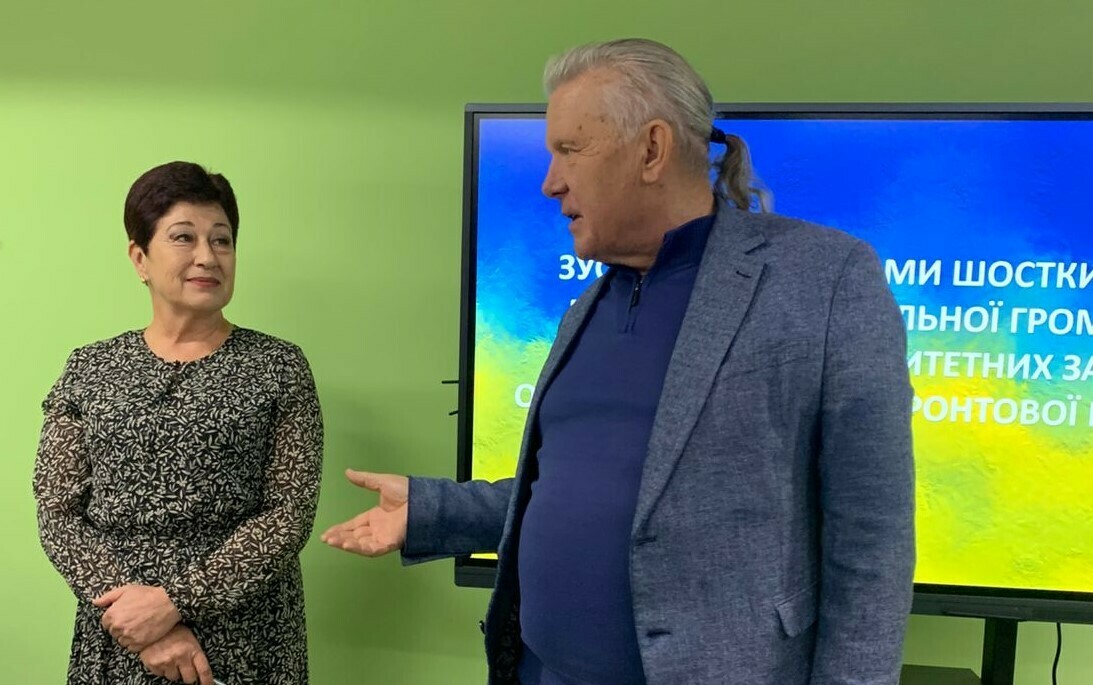
Mykola Noha in the underground school
Mykola Noha showing Ukrainian Prime Minister Yuliia Svyrydenko the aftermath of Russian shelling of the railway in Shostka. Early October 2025
Фото 9. The activities of the Red Cross in Shostka
‘We are building an underground hospital…’
You mentioned that the generators came to you from all over Ukraine. Is the Shostka community taking part in the ‘Shoulder-to-Shoulder: Cohesive Communities’ project?
Of course! We have four partner communities that support us in many ways. They provide us with material support, as well as moral and psychological support. I am referring here to recreation for our children at the rear. This is important for their recovery and healthy development. We work with our partners on the ‘Shoulder-to-Shoulder’ project in many areas, and the Brovary community in the Kyiv region is our biggest supporter. They provide assistance in healthcare, children's healthcare, the economy, and the development of our territories. We have to survive somehow on the border. I am very glad that we have a shoulder to lean on.
What is your attitude towards the main idea of the ‘Shoulder-to-Shoulder: Cohesive Communities’ project, which aims to establish a network of strong communities along the border with Russia and in frontline areas, supported by the entire Ukraine?
Extremely positive! I am grateful to the President and the Government for supporting the border communities in this challenging situation. Oleh Hryhorov, Head of the Sumy Regional Military Administration, has personally visited us to learn about the problems we are facing and to provide us with all the necessary assistance. He also coordinated the activities of the headquarters himself to eliminate the consequences of the shelling on 3–4 October.
Is there sufficient food and personal hygiene products for people?
Yes, there is. Their misfortune has brought them closer together. They actively help each other. Furthermore, immediately after the terrible shelling, various entrepreneurs and volunteers came to us and provided our residents with food, including hot meals, by setting up mobile kitchens throughout the community. But that does not mean that the people they feed have no food and are starving. It is simply more convenient for them, because without water and electricity, it is difficult to cook. It is a very positive process: people cook together, communicate, unite and find common ground. Eventually, they even bring their own food to these kitchens. The city council also provides food products, which volunteers then use to prepare meals. There is a very friendly, welcoming atmosphere around these kitchens, which helps people get through these terrible times.
Does your community feel supported by international funds and organisations?
Yes, of course it does. Most of the 600-plus generators I mentioned earlier, for example, were provided by our partners. We are very grateful to them for that!
Is there a department within the Shostka City Council that seeks donor funds and humanitarian aid?
No, all departments are involved one way or another. We have partners in Lithuania, Poland, and Germany. A shipment of electric air heaters is currently on its way to us from Austria. Many public organisations in Ukraine and abroad are also providing us with assistance because this tragedy unites not only Ukrainians, but all of Europe. In other words, thanks to Ukraine, Europe is now united. It is not only governments that are becoming closer; businesspeople, volunteers, and ordinary people are also coming together too. They are beginning to understand that we can only survive together.
How do schools manage to operate in these conditions that you described as ‘miserable’?
Either underground or online. This means that children do not go to bomb shelters every day to study, although we have made all the necessary preparations. We have two large underground schools and the rest of the schools have various types of bomb shelter. In other words, no child is studying on the surface.
But you have no underground hospitals, do you? How do the doctors work?
Our hospitals are currently operating on alternative energy sources and providing patients with the care they need. We have also started building an underground clinic. Eventually, we will have underground hospitals.
Please describe how the Shostka community is supporting the army?
I do not wish to comment on the provision of this assistance.
At this point, Mr Noha ended our conversation, having already tried to do so several times before. Each time, however, we had managed to persuade him to answer ‘just one more question’. In total, the conversation lasted just over 11 minutes – almost like a staff meeting at the Shostka City Council. Consequently, we (and our readers) still know nothing about how the city’s utilities work in dangerous border conditions, whether residents have internet and mobile communications, what the city authorities are doing to prevent people from fleeing to the west, and, most importantly, how the city authorities envisage the future of their community. Perhaps we will talk about this again later. Briefly, of course, but we will talk.
During the approval process, the mayor did not change a single word in the article. However, he later sent his own account of what he experienced during the night of 3–4 October, after the shelling. He posted this story on Facebook two days ago. We are publishing it here with our editorial changes.
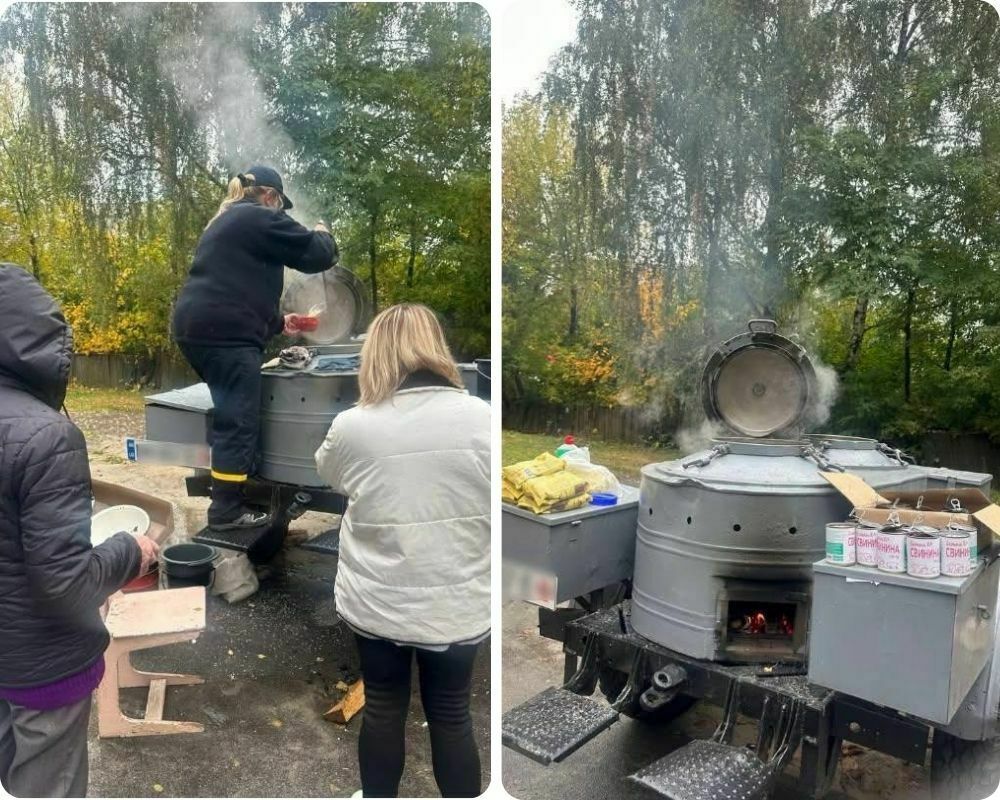
Volunteer mobile kitchens on the streets of the Shostka community
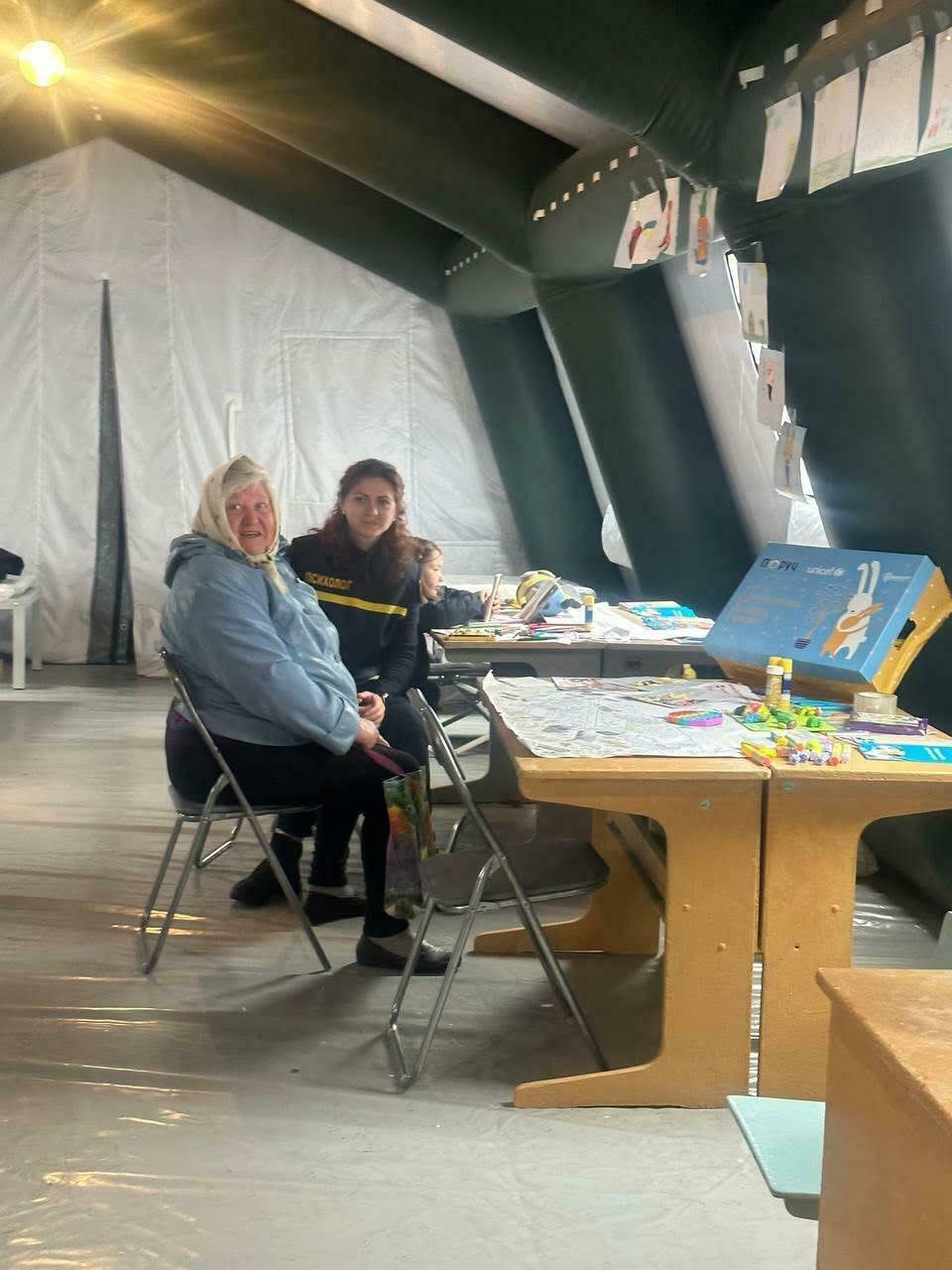
The road of resistance
‘The aggressor launched a massive strike on the city, with Russian ‘Shahed’ and ‘Gerbera’ drones tearing apart the community’s infrastructure for a whole day. The night, morning and day that followed were therefore difficult. A tense videoconference meeting was held, during which a range of problems were outlined and extremely difficult tasks were set. The main priority was to eliminate the consequences of enemy terror. After the meeting, endless trips to the sites began.
At one of them, a group of stern, exhausted but resilient people are working to restore the electricity supply for the residents of our community. Suddenly, another alarm sounds. ‘Shaheds’ are flying very close to the facility, but no one stops working or runs to hide. Instead, they stubbornly continue working.
Then onto another site... There, too, consultations take place, solutions are proposed and work begins immediately. The entire community needs clear, decisive and swift action. The non-stop rain is making things even more difficult. Even the equipment is soaked, causing it to malfunction. But the people persevere! Here, for example, is Oleksandr, the head of the regional energy department, standing in a muddy puddle in his smart shoes and fixing a switch. Those around him are also ignoring the conditions and working with complete dedication.
At night, I finally return to my dark flat, have dinner and think about tomorrow. There are so many complex technical solutions that need to be implemented! We have to restore the power systems with new parameters and operating conditions. Suddenly, I receive a phone call from the duty officer reporting a car accident on Posiolka. Due to the accident, the heating network crossing has been destroyed. No sooner have I started thinking about how to resolve the situation than I receive another call
A woman’s voice is begging for help… A very young woman lives on Voronezka Street in Shostka. There was light there last night, but now it is completely dark and cold. This woman’s child is ill and crying constantly. Through her tears, she says that her husband, who underwent amputation after being wounded, is due to return home soon. She just keeps crying and crying…
Then I call the energy company and the State Emergency Service and beg them to provide ‘targeted assistance’. They promise to do everything they can. The woman calls again because she has no one else to turn to. I can hear her child crying in the background. She is crying too. I tell her not to cry, but to be strong so she can welcome her husband home. But she continues to cry, and suddenly I find myself in tears too…
Then I tell her that everyone in our community is having a very difficult time right now and that the enemy has mercilessly destroyed the power supply system. And it is even harder on the frontline… The woman gradually agrees. Finally, she calms down completely. It is well past midnight when an unfamiliar woman from Voronezka Street promises to be strong and prepare to meet her husband.
My kitchen is dark and cold. Outside, it is raining and the city is being torn apart. The Russian aggressor is trying to destroy it. But we are not discouraged, and we never will be! We have united, and with God’s help, we will defend it! The next morning, we will stand and fight once again so that our Shostka will survive, so that people will have light in their homes and, with it, hope for a fair PEACE!
Glory to God! Glory to Ukraine!’
‘Resistance’, a painting by Mykola Noha completed six months ago
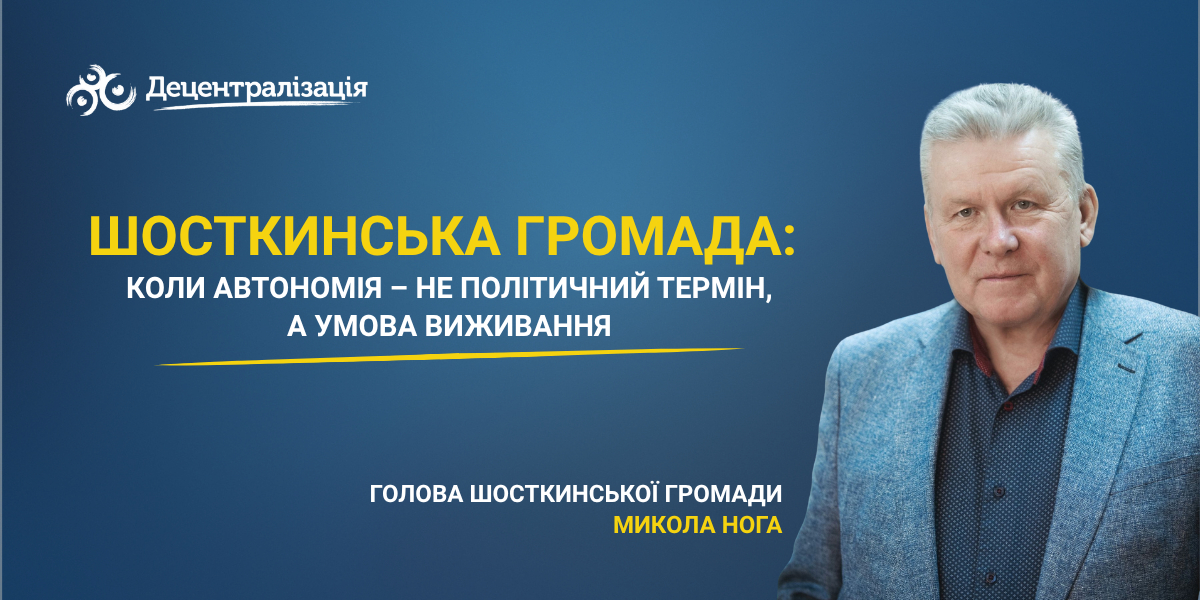
12 January 2026
Стартує прийом заявок на фінансування укриттів у ЗЗСО
Стартує прийом заявок на фінансування укриттів...
З 12 січня засновники закладів освіти можуть подавати заявки на отримання державної субвенції на облаштування...
12 January 2026
Земля, яку забруднила війна: методика оцінки та шанс на відшкодування
Земля, яку забруднила війна: методика оцінки та...
Війна залишає після себе не лише зруйновані будинки й дороги. Значна частина втрат для територіальних громад — поза...
12 January 2026
Єдині правила для інвестицій: що це означає для громад
Єдині правила для інвестицій: що це означає для...
У 2025 році в Україні фактично поставлено крапку в «хаотичному» підході до публічних інвестицій. Як повідомляє...
12 January 2026
25 громад готові взяти участь в...
25 територіальних громад з різних регіонів України подали заявки на участь в експериментальному проєкті зі...
